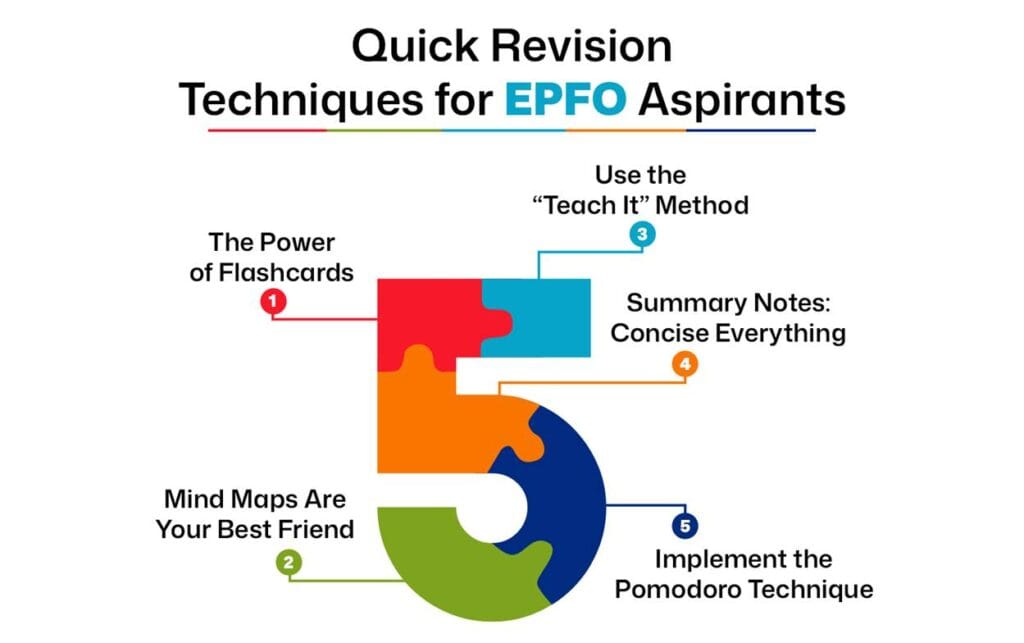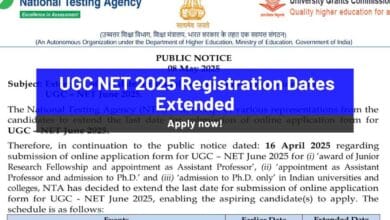Quick Revision Techniques for EPFO Candidates
If you are an UPSC EPFO aspirant, then here are some quick revision techniques that can boost your study process.

You’ve worked hard preparing for the UPSC EPFO exam, but as the exam day approaches, you might start feeling overwhelmed—chapters blur together, notes pile up, and recalling topics from the UPSC EPFO syllabus becomes difficult. It’s a common and stressful experience.
Well, we definitely don’t want that to happen to you! That’s why we’re going to dive into some quick revision techniques. These are practical, proven methods to help you recall when it matters most and bring confidence for the UPSC EPFO 2025 exam.
Let’s dive in, but first let’s understand the importance of quick revision.
Table of Contents
Why is Quick Revision so Important?
Think of quick revision as a final step of your UPSC EPFO preparation. Here’s why quick revision is super important:

- Puts Things Together: Quick revision helps you connect different topics. It makes everything you learned fit into one clear picture.
- Helps You Remember Faster: It trains your brain to pull out information quickly, which is crucial for exam day when every second counts.
- Makes You Feel Confident: Knowing you’ve covered everything, even briefly, reduces anxiety.
- Identify Knowledge Gaps: Sometimes, a quick revision reveals areas you thought you knew but need more work on.
So, don’t underestimate the power of quick revision. Now that we know why it’s so important, let’s learn how to do it quickly and effectively.
Quick Revision Techniques for EPFO Aspirants
Here are the techniques that can help you quickly revise for the UPSC EPFO 2025 exam:

1. The Power of Flashcards
Flashcards are small cards with a question or term on one side and the answer on the other. Think of them as tiny, portable study buddies. They are compact and effective.
What to put on them:
- Formulas: For subjects like Maths or Accounting
- Key Dates: Important dates from History or Labour Laws.
- Definitions: For terms in Economics or Industrial Relations.
- Short Forms: Acronyms and what they stand for.
How to use them:
- Active Recall: Look at the question or term on one side. Try hard to remember the answer. Then, flip the card to check if you got it right.
- Review Smart: Look at the cards you got wrong more often. For the ones you know well, review them less frequently.
- Carry Them Everywhere: Have some time to spare during your lunch break? Or riding a bus or train? Pull out your flashcards. They’re perfect for quick revision.
- Make Your Own: Creating your own flashcards helps you learn and remember the information even better.
2. Mind Maps Are Your Best Friend
Mind Maps are a visual way to organize notes for exams like UPSC EPFO. You start with a main idea in the middle and draw lines (branches) out to related topics. They are fantastic tools for visual learners, allowing you to visualize your notes and connect ideas easily.
How to make them:
- Start with Central Topic: Put your main topic in the middle of a blank page (like “Indian Economy”).
- Branch Out: Draw lines from the center for main subtopics (like “Sectors,” “Policies,” “Challenges”).
- Add Details: On each branch, write down short keywords, draw small pictures, or use quick phrases.
- Use Color: Use different colors for different branches or ideas. This makes it easier to remember.
Mind maps benefits:
- They clearly show how different ideas link up.
- You can fit a lot of information onto just one page.
- The visual layout helps your brain remember things better.
- They’re excellent for quick revision.
3. Use the “Teach It” Method
“Teach It” method means that if you can teach any topic to someone, you will definitely know it. This method allows you to put your understanding into words.
How it works:
- Choose a Topic: Pick any subject you need to revise.
- Imagine Your Student: Pretend you’re explaining it to someone who knows absolutely nothing about it (maybe a family member, a pet, or even a wall).
- Explain Aloud: Talk through the topic out loud. You can explain it to a wall, your dog, or even a willing family member.
- Keep it Simple: Break down tricky ideas into easy-to-understand parts. Use simple examples if you can.
Why it’s effective:
- When you try to explain, you quickly find out the gaps in your knowledge.
- It forces you to think clearly and put your ideas in a logical order.
- Speaking it out loud helps your brain retain the information much better.
- You’ll automatically focus on the most important parts of the topic, cutting out the fluff.
4. Summary Notes: Concise Everything
Summary notes help you note down the important points as you learn new concepts or understand the basics of any topic. It is all about making big information small. Take large amounts of text and shrink them into short, clear summaries.
How to make own notes
- Short Notes: After studying a chapter, write down only the most critical points in your own words.
- Bullet Points: Use bullet points to note down key facts, features, advantages/ disadvantages, etc.
Why it works:
- It makes you focus on the most important information.
- It improves your understanding of the core concepts.
- It creates easy-to-review notes for last minute revision.
Important Note: It’s always better to make your own summary notes. Don’t just download them from a website or borrow them from a friend. Making your own notes helps you learn and remember the information much better!
5. Implement the Pomodoro Technique
This method uses short, focused study times that can really help you learn more and grab a good score in EPFO exams.
How it works:
- Set a timer for 25 minutes.
- For these 25 minutes, work only on one task. No distractions.
- When the timer rings, take a 5-minute break.
- After you do 4 of these 25-minute study sessions take a longer break of 20-30 minutes.
Benefits:
- Prevents you from getting too tired or overwhelmed.
- Trains your brain to concentrate better during those short bursts.
- Makes Big study sessions seem less daunting.
- Keeps your mind fresh.
Conclusion
EPFO is a competitive exam, but with smart preparation and effective revision, you can significantly boost your chances of success. These practical, proven revision techniques help you learn more efficiently and recall information better when it counts.
So, start implementing them today and be consistent.






